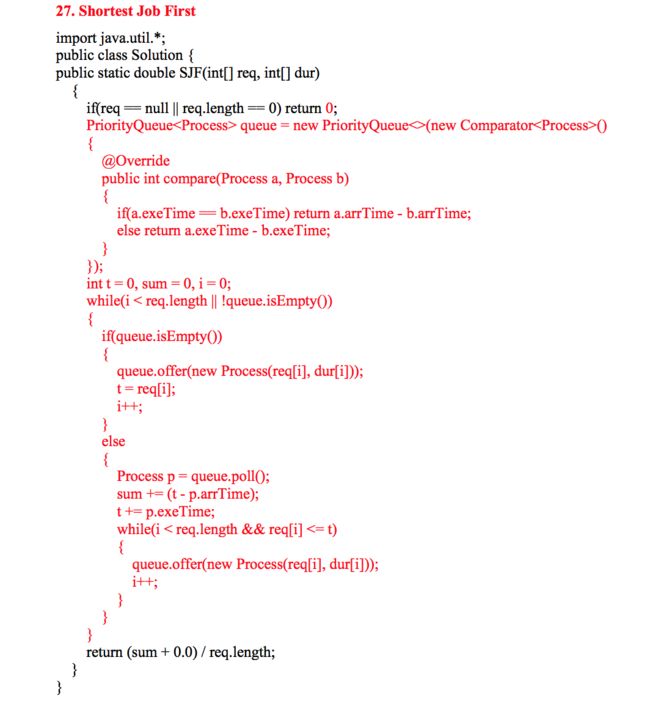- [Swift]LeetCode943. 最短超级串 | Find the Shortest Superstring
黄小二哥
swift
★★★★★★★★★★★★★★★★★★★★★★★★★★★★★★★★★★★★★★★★➤微信公众号:山青咏芝(shanqingyongzhi)➤博客园地址:山青咏芝(https://www.cnblogs.com/strengthen/)➤GitHub地址:https://github.com/strengthen/LeetCode➤原文地址:https://www.cnblogs.com/streng
- Python位置参数、默认参数、可变参数、关键字参数、命名关键字参数、命名位置参数
西二旗王员外
Python综合python开发语言numpy
前言学习python,一定会使用函数、方法,在使用过程中,会使用到参数,参数在不同的编程上下文中有不同的名字,一起学习下那些耳熟能详的参数位置参数默认参数可变参数关键字参数命名关键字参数命名位置参数创建一个拥有4个参数的函数deftemp(first,second="HelloWorld",*args,**kwargs)print(first)print(second)print(args)pri
- 自定义分区
我的K8409
Hadoophdfshadoop大数据
通过简单例子了解partition分区类的重写方法分区是在MR的过程中进行的,属于Shuffle阶段但是在Job端不要忘记进行调用:job.setPartitionerClass(xxx.class)按照年龄分区:classAgePartitionerextendsPartitioner{@OverridepublicintgetPartition(MyComparablekey,NullWrit
- 【显示 后台运行 & 的命令】
晨春计
debuglinux服务器运维
目录背景步骤详解示例背景当你在Linuxshell中使用&符号将一个命令放到后台运行时,你可以使用jobs命令来查看这些后台进程的状态。但是,jobs命令并不会直接显示进程的PID(进程ID)。它会显示一个作业列表,其中包括每个作业的状态和一个作业标识符(通常是百分号%后面跟着一个数字),但不会直接显示PID。获取后台进程的PID步骤:1、使用jobs命令查看后台作业。2、使用ps命令配合grep
- 前端知识点
ZhangTao_zata
前端javascriptcss
下面是一个最基本的html代码body{font-family:Arial,sans-serif;margin:20px;}//JavaScriptfunctionthatdisplaysanalertwhencalledfunctionshowMessage(){alert("Hello!Youclickedthebutton.");}MyFirstHTMLPageWelcometoMyPage
- C#动态加载DLL程序集及使用反射创建实例-简记
不全
C#相关Asp.netWebFormAsp.netMVCc#Assembly反射程序集
Assembly动态加载程序集:分两种情况:1、需要加载的程序集已经在程序中被引用了,则直接从当前程序域中查找即可:Assemblyassembly=AppDomain.CurrentDomain.GetAssemblies().FirstOrDefault(x=>x.GetName().Name.Contains("theAssemblyName"));2、需要加载的程序集未被加载,则使用程序集
- 谈谈你对AQS的理解
Mutig_s
jucjava开发语言面试后端
AQS概述AQS,全称为AbstractQueuedSynchronizer,是Java并发包(java.util.concurrent)中一个核心的框架,主要用于构建阻塞式锁和相关的同步器,也是构建锁或者其他同步组件的基础框架。AQS提供了一种基于FIFO(First-In-First-Out)的CLH(三个人名缩写)双向队列的机制,来实现各种同步器,如ReentrantLock、Semapho
- first&second
tmax
first:#!/bin/bashfilm="thefirstfilm"echo"$film"./second#创建子进程运行second,在子进程地址空间运行secondecho"$film"second:#!/bin/bashecho"$film"film="thesecondfilm"echo"$film"对first、second添加可执行权限后执行./first结果thefirstfil
- Android jni中数组参数的传递方式
lokeyme
Andriodandroid开发JNINDKjavac语言
1、背景今天调试了一下Androidjni关于Java中调用C代码的程序,发现我的数组参数传递方式不对,导致值传递不正确,我的方法是:C代码,入口函数#include#includejintJava_sony_MedicalRecordDemo_MainActivity_decryptionSuccess(JNIEnv*env,jobjectthiz,jintAttr[]){returnAttr[
- 主流行架构
rainbowcheng
架构架构
nexus,gitlab,svn,jenkins,sonar,docker,apollo,catteambition,axure,蓝湖,禅道,WCP;redis,kafka,es,zookeeper,dubbo,shardingjdbc,mysql,InfluxDB,Telegraf,Grafana,Nginx,xxl-job,Neo4j,NebulaGraph是一个高性能的,NOSQL图形数据库
- P4779 【模板】单源最短路径(堆优化dijkstra)
summ1ts
一些模版算法图论最短路dijkstra堆
堆优化dijkstra,时间复杂度,我个人写习惯的模版。#includeusingnamespacestd;#definePIIpair#definefifirst#definesesecondconstintN=2e5+10;intread(){intx=0,f=1;charch=getchar();while(!isdigit(ch)){if(ch=='-')f=-1;ch=getchar()
- python爬虫(5)之CSDN
It is a deal️
小项目pythonjson爬虫
CSDN的爬虫相对于doubatop250更加简单,一般只需要title和url即可下面是相关的代码:#爬虫之csdn#分析urlhttps://www.csdn.net/api/articles?type=more&category=python&shown_offset=0(firstpage)#https://www.csdn.net/api/articles?type=more&categ
- 【五十五,模型加载-2 模型文件格式】
Woodlouse
Obj和mtl文件ObjObj文件是3D模型文件格式,由Alias|Wavefront公司为3D建模和动画软件AdvancedVisualizer开发的一种标准,用于3D软件模型互导。包含数据信息:顶点坐标信息顶点的纹理坐标信息顶点法向量信息mtlmtl文件定义材质信息,包含数据信息:纹理贴图环境光镜面光散射光Obj文件格式obj文件中的信息以行为单位表示一条数据,可以根据行开头的字符判断后续数据
- Picture Butler-Instant Save
逍遥alan
Thisisaveryconvenientandpracticalsoftware.Userscanusethissoftwaretoclassifyphotos.Firsttheuserneedstocreateanalbum.Selectthealbumcoverandenteraname.Clickonthealbumtoaddyourphoto.Simpleoperationandsimp
- 汤臣倍健,三七互娱,得物,顺丰,快手,游卡,oppo,康冠科技,途游游戏,埃科光电25秋招内推
2401_86288678
c语言python算法前端java
汤臣倍健,三七互娱,得物,顺丰,快手,游卡,oppo,康冠科技,途游游戏,埃科光电25秋招内推①得物【八大职类】技术、供应链、产品、运营、设计、职能、商品研究、风控等大类【内推码】RTHEA59【一键内推】https://poizon.jobs.feishu.cn/s/iMo1482J②汤臣倍健【招聘岗位】营销类、市场类、智造类、职能类【内推链接】https://sourl.cn/giXCGq【内
- 汤臣倍健,三七互娱,得物,顺丰,快手,游卡,oppo,康冠科技,途游游戏,埃科光电25秋招内推
2401_86288678
python游戏c++前端算法
汤臣倍健,三七互娱,得物,顺丰,快手,游卡,oppo,康冠科技,途游游戏,埃科光电25秋招内推①得物【八大职类】技术、供应链、产品、运营、设计、职能、商品研究、风控等大类【内推码】RTHEA59【一键内推】https://poizon.jobs.feishu.cn/s/iMo1482J②汤臣倍健【招聘岗位】营销类、市场类、智造类、职能类【内推链接】https://sourl.cn/giXCGq【内
- 栈区-----顺序栈------队列
(笑)z
数据结构
栈栈(Stack)是一种遵循后进先出(LIFO,LastInFirstOut)原则的有序集合。这种数据结构只允许在栈顶进行添加(push)或删除(pop)元素的操作。换句话说,最新添加的元素会被最先移除。栈的这种特性使得它在多种编程和应用场景中非常有用,比如函数调用、括号匹配、表达式求值、页面访问历史等。只允许从一端进行数据的插入和删除的线性存储结构顺序栈:类似数组满增栈,满减栈,空增栈,空减栈空
- 6/13SteveJobs…Day45-School-translatation
Serenaliu85
在木头做的柜台前,破烂的夹子里装满了厚厚的商品目录册,人们会为了开关,电阻器,电容器商品讨价还价,有时为了最新的记忆芯片还价。他的爸爸过去为了汽车配件常做那样的事,并且他成功地还低价格因为他比售货员还了解每个产品的价值。乔布斯也向父亲那样。他热衷于谈判并从中获得实惠,这也让他对电子零件有了更充分的了解。他会去电子产品跳蚤市场,比如SanJose交换大会,找到含有一些价值芯片的旧线路板或者零部件和卖
- 【Leetcode】581. Shortest Unsorted Continuous Subarray
云端漫步_b5aa
Givenanintegerarray,youneedtofindonecontinuoussubarraythatifyouonlysortthissubarrayinascendingorder,thenthewholearraywillbesortedinascendingorder,too.Youneedtofindtheshortestsuchsubarrayandoutputitsle
- mysql row_number吗_MySQL中的ROW_NUMBER()是什么?
春容
mysqlrow_number吗
MySQL版本8.0中包含的Row_NUMBER()。这是一种窗口函数。这可用于为行分配序列号。要了解,请借助CREATEpcommand创建一个表-建立表格CREATEtablerowNumberDemo->(->FirstNamevarchar(100)->);插入记录INSERTintorowNumberDemovalues('john');INSERTintorowNumberDemova
- .NET Core WebAPI中使用SqlSugar连接数据库并使用DbFirst生成实体
Tigers996
.NET数据库.netcore
一、添加NuGet包,配置文件添加SqlSugarCore包添加一个控制台应用,用于DbFirst使用;添加类库,创建一个EntityMap文件夹,存放实体信息//SqlSugar使用DbFirst生成实体//添加NuGet包SqlSugarCore//链接数据库字符串ConnectionConfigconnectionConfig=newConnectionConfig(){Connection
- First page
Simon_Liu
Now,finallystarted.NotsurehowlongIcankeepthisup,hopefullylongenough.
- python实现leetcode之40. 组合总和 II
深圳都这么冷
解题思路先将candidates排序,数组很短,排序很快然后看最小的元素candidates[0]如果最小的元素大于等于target,就可以停止递归了否则,组合包含两种情况1.有第一项first,然后才是rest的组合2.没有第一项,都是rest的组合40.组合总和II代码cache={}classSolution:defcombinationSum2(self,candidates:List[i
- Tomato and egg noodles
EHHHA
First,washandcutupthetomato.Next,pourtheeggintothebowlThen,potthenoodlesintothepot.Next,putthenoodlesandeggsintothepot.waitfiveminutes.Finaly,putthenoodlesinit.Don'tforgetaddsomesalt.andwecaneatit.图片发
- kubernetes里面那些事————控制器
背锅攻城师
kuberneteskubernetes容器云原生
资源-控制器一,控制器作用二,控制器类型2.1,Deployment:无状态应用部署2.2,DaemonSet:确保所有Node运行同一个pod2.3,StatefulSet:有状态应用部署2.4,Job:一次性任务2.5,CronJob:定时任务2.6,pod2.7,service2.8,replicaset2.9,endpoints三,控制器yaml应用3.1,Deployment3.2,Da
- C++ STL概念之 算法
元凌丶
算法c++开发语言
sortdefault(1)templatevoidsort(RandomAccessIteratorfirst,RandomAccessIteratorlast);custom(2)templatevoidsort(RandomAccessIteratorfirst,RandomAccessIteratorlast,Comparecomp);作用:用于对容器中的元素进行排序。它通常采用快速排序算
- LeetCode笔记:717. 1-bit and 2-bit Characters
Cloudox_
问题(Easy):Wehavetwospecialcharacters.Thefirstcharactercanberepresentedbyonebit0.Thesecondcharactercanberepresentedbytwobits(10or11).Nowgivenastringrepresentedbyseveralbits.Returnwhetherthelastcharacter
- 【ShuQiHere】深入浅出栈(Stack)数据结构:从基本操作到实现
ShuQiHere
数据结构java算法
【ShuQiHere】引言在计算机科学中,栈(Stack)是一种极为常见的抽象数据类型(AbstractDataType,ADT),它在表达式求值、递归调用、内存管理等领域得到了广泛应用。栈是一种遵循**后进先出(LastInFirstOut,LIFO)**原则的数据结构,这意味着最后进入栈的元素会最先被取出。理解栈的工作原理,是学习更多复杂算法和数据结构的基础。这就好比你在往一个箱子里放东西,最
- Flutter3备忘: GetX常用命令
mulegame
Flutterflutter
D:\flutter_app\getcreatepagesearch//创建一个firstPage在productContent目录中getcreateview:firstPageonproductContentgetcreateview:secondPageonproductContentgetcreateview:thirdPageonproductContentgetgeneratemode
- 将json型字符串转换为List<Map>的格式处理
ZJJG4
前后端交互
将json型字符串转换为List>的格式处理1、前台拼接字符串//保存事件$("#btn_save").on("click",(function(e){varpcbh=$("#sel_pcbh").val();varsqargs={list:[]};$("#clgltabletr:not(':first,:last')").each(function(i){varsqjson={};sqjson.
- 怎么样才能成为专业的程序员?
cocos2d-x小菜
编程PHP
如何要想成为一名专业的程序员?仅仅会写代码是不够的。从团队合作去解决问题到版本控制,你还得具备其他关键技能的工具包。当我们询问相关的专业开发人员,那些必备的关键技能都是什么的时候,下面是我们了解到的情况。
关于如何学习代码,各种声音很多,然后很多人就被误导为成为专业开发人员懂得一门编程语言就够了?!呵呵,就像其他工作一样,光会一个技能那是远远不够的。如果你想要成为
- java web开发 高并发处理
BreakingBad
javaWeb并发开发处理高
java处理高并发高负载类网站中数据库的设计方法(java教程,java处理大量数据,java高负载数据) 一:高并发高负载类网站关注点之数据库 没错,首先是数据库,这是大多数应用所面临的首个SPOF。尤其是Web2.0的应用,数据库的响应是首先要解决的。 一般来说MySQL是最常用的,可能最初是一个mysql主机,当数据增加到100万以上,那么,MySQL的效能急剧下降。常用的优化措施是M-S(
- mysql批量更新
ekian
mysql
mysql更新优化:
一版的更新的话都是采用update set的方式,但是如果需要批量更新的话,只能for循环的执行更新。或者采用executeBatch的方式,执行更新。无论哪种方式,性能都不见得多好。
三千多条的更新,需要3分多钟。
查询了批量更新的优化,有说replace into的方式,即:
replace into tableName(id,status) values
- 微软BI(3)
18289753290
微软BI SSIS
1)
Q:该列违反了完整性约束错误;已获得 OLE DB 记录。源:“Microsoft SQL Server Native Client 11.0” Hresult: 0x80004005 说明:“不能将值 NULL 插入列 'FZCHID',表 'JRB_EnterpriseCredit.dbo.QYFZCH';列不允许有 Null 值。INSERT 失败。”。
A:一般这类问题的存在是
- Java中的List
g21121
java
List是一个有序的 collection(也称为序列)。此接口的用户可以对列表中每个元素的插入位置进行精确地控制。用户可以根据元素的整数索引(在列表中的位置)访问元素,并搜索列表中的元素。
与 set 不同,列表通常允许重复
- 读书笔记
永夜-极光
读书笔记
1. K是一家加工厂,需要采购原材料,有A,B,C,D 4家供应商,其中A给出的价格最低,性价比最高,那么假如你是这家企业的采购经理,你会如何决策?
传统决策: A:100%订单 B,C,D:0%
&nbs
- centos 安装 Codeblocks
随便小屋
codeblocks
1.安装gcc,需要c和c++两部分,默认安装下,CentOS不安装编译器的,在终端输入以下命令即可yum install gccyum install gcc-c++
2.安装gtk2-devel,因为默认已经安装了正式产品需要的支持库,但是没有安装开发所需要的文档.yum install gtk2*
3. 安装wxGTK
yum search w
- 23种设计模式的形象比喻
aijuans
设计模式
1、ABSTRACT FACTORY—追MM少不了请吃饭了,麦当劳的鸡翅和肯德基的鸡翅都是MM爱吃的东西,虽然口味有所不同,但不管你带MM去麦当劳或肯德基,只管向服务员说“来四个鸡翅”就行了。麦当劳和肯德基就是生产鸡翅的Factory 工厂模式:客户类和工厂类分开。消费者任何时候需要某种产品,只需向工厂请求即可。消费者无须修改就可以接纳新产品。缺点是当产品修改时,工厂类也要做相应的修改。如:
- 开发管理 CheckLists
aoyouzi
开发管理 CheckLists
开发管理 CheckLists(23) -使项目组度过完整的生命周期
开发管理 CheckLists(22) -组织项目资源
开发管理 CheckLists(21) -控制项目的范围开发管理 CheckLists(20) -项目利益相关者责任开发管理 CheckLists(19) -选择合适的团队成员开发管理 CheckLists(18) -敏捷开发 Scrum Master 工作开发管理 C
- js实现切换
百合不是茶
JavaScript栏目切换
js主要功能之一就是实现页面的特效,窗体的切换可以减少页面的大小,被门户网站大量应用思路:
1,先将要显示的设置为display:bisible 否则设为none
2,设置栏目的id ,js获取栏目的id,如果id为Null就设置为显示
3,判断js获取的id名字;再设置是否显示
代码实现:
html代码:
<di
- 周鸿祎在360新员工入职培训上的讲话
bijian1013
感悟项目管理人生职场
这篇文章也是最近偶尔看到的,考虑到原博客发布者可能将其删除等原因,也更方便个人查找,特将原文拷贝再发布的。“学东西是为自己的,不要整天以混的姿态来跟公司博弈,就算是混,我觉得你要是能在混的时间里,收获一些别的有利于人生发展的东西,也是不错的,看你怎么把握了”,看了之后,对这句话记忆犹新。 &
- 前端Web开发的页面效果
Bill_chen
htmlWebMicrosoft
1.IE6下png图片的透明显示:
<img src="图片地址" border="0" style="Filter.Alpha(Opacity)=数值(100),style=数值(3)"/>
或在<head></head>间加一段JS代码让透明png图片正常显示。
2.<li>标
- 【JVM五】老年代垃圾回收:并发标记清理GC(CMS GC)
bit1129
垃圾回收
CMS概述
并发标记清理垃圾回收(Concurrent Mark and Sweep GC)算法的主要目标是在GC过程中,减少暂停用户线程的次数以及在不得不暂停用户线程的请夸功能,尽可能短的暂停用户线程的时间。这对于交互式应用,比如web应用来说,是非常重要的。
CMS垃圾回收针对新生代和老年代采用不同的策略。相比同吞吐量垃圾回收,它要复杂的多。吞吐量垃圾回收在执
- Struts2技术总结
白糖_
struts2
必备jar文件
早在struts2.0.*的时候,struts2的必备jar包需要如下几个:
commons-logging-*.jar Apache旗下commons项目的log日志包
freemarker-*.jar
- Jquery easyui layout应用注意事项
bozch
jquery浏览器easyuilayout
在jquery easyui中提供了easyui-layout布局,他的布局比较局限,类似java中GUI的border布局。下面对其使用注意事项作简要介绍:
如果在现有的工程中前台界面均应用了jquery easyui,那么在布局的时候最好应用jquery eaysui的layout布局,否则在表单页面(编辑、查看、添加等等)在不同的浏览器会出
- java-拷贝特殊链表:有一个特殊的链表,其中每个节点不但有指向下一个节点的指针pNext,还有一个指向链表中任意节点的指针pRand,如何拷贝这个特殊链表?
bylijinnan
java
public class CopySpecialLinkedList {
/**
* 题目:有一个特殊的链表,其中每个节点不但有指向下一个节点的指针pNext,还有一个指向链表中任意节点的指针pRand,如何拷贝这个特殊链表?
拷贝pNext指针非常容易,所以题目的难点是如何拷贝pRand指针。
假设原来链表为A1 -> A2 ->... -> An,新拷贝
- color
Chen.H
JavaScripthtmlcss
<!DOCTYPE HTML PUBLIC "-//W3C//DTD HTML 4.01 Transitional//EN" "http://www.w3.org/TR/html4/loose.dtd"> <HTML> <HEAD>&nbs
- [信息与战争]移动通讯与网络
comsci
网络
两个坚持:手机的电池必须可以取下来
光纤不能够入户,只能够到楼宇
建议大家找这本书看看:<&
- oracle flashback query(闪回查询)
daizj
oracleflashback queryflashback table
在Oracle 10g中,Flash back家族分为以下成员:
Flashback Database
Flashback Drop
Flashback Table
Flashback Query(分Flashback Query,Flashback Version Query,Flashback Transaction Query)
下面介绍一下Flashback Drop 和Flas
- zeus持久层DAO单元测试
deng520159
单元测试
zeus代码测试正紧张进行中,但由于工作比较忙,但速度比较慢.现在已经完成读写分离单元测试了,现在把几种情况单元测试的例子发出来,希望有人能进出意见,让它走下去.
本文是zeus的dao单元测试:
1.单元测试直接上代码
package com.dengliang.zeus.webdemo.test;
import org.junit.Test;
import o
- C语言学习三printf函数和scanf函数学习
dcj3sjt126com
cprintfscanflanguage
printf函数
/*
2013年3月10日20:42:32
地点:北京潘家园
功能:
目的:
测试%x %X %#x %#X的用法
*/
# include <stdio.h>
int main(void)
{
printf("哈哈!\n"); // \n表示换行
int i = 10;
printf
- 那你为什么小时候不好好读书?
dcj3sjt126com
life
dady, 我今天捡到了十块钱, 不过我还给那个人了
good girl! 那个人有没有和你讲thank you啊
没有啦....他拉我的耳朵我才把钱还给他的, 他哪里会和我讲thank you
爸爸, 如果地上有一张5块一张10块你拿哪一张呢....
当然是拿十块的咯...
爸爸你很笨的, 你不会两张都拿
爸爸为什么上个月那个人来跟你讨钱, 你告诉他没
- iptables开放端口
Fanyucai
linuxiptables端口
1,找到配置文件
vi /etc/sysconfig/iptables
2,添加端口开放,增加一行,开放18081端口
-A INPUT -m state --state NEW -m tcp -p tcp --dport 18081 -j ACCEPT
3,保存
ESC
:wq!
4,重启服务
service iptables
- Ehcache(05)——缓存的查询
234390216
排序ehcache统计query
缓存的查询
目录
1. 使Cache可查询
1.1 基于Xml配置
1.2 基于代码的配置
2 指定可搜索的属性
2.1 可查询属性类型
2.2 &
- 通过hashset找到数组中重复的元素
jackyrong
hashset
如何在hashset中快速找到重复的元素呢?方法很多,下面是其中一个办法:
int[] array = {1,1,2,3,4,5,6,7,8,8};
Set<Integer> set = new HashSet<Integer>();
for(int i = 0
- 使用ajax和window.history.pushState无刷新改变页面内容和地址栏URL
lanrikey
history
后退时关闭当前页面
<script type="text/javascript">
jQuery(document).ready(function ($) {
if (window.history && window.history.pushState) {
- 应用程序的通信成本
netkiller.github.com
虚拟机应用服务器陈景峰netkillerneo
应用程序的通信成本
什么是通信
一个程序中两个以上功能相互传递信号或数据叫做通信。
什么是成本
这是是指时间成本与空间成本。 时间就是传递数据所花费的时间。空间是指传递过程耗费容量大小。
都有哪些通信方式
全局变量
线程间通信
共享内存
共享文件
管道
Socket
硬件(串口,USB) 等等
全局变量
全局变量是成本最低通信方法,通过设置
- 一维数组与二维数组的声明与定义
恋洁e生
二维数组一维数组定义声明初始化
/** * */ package test20111005; /** * @author FlyingFire * @date:2011-11-18 上午04:33:36 * @author :代码整理 * @introduce :一维数组与二维数组的初始化 *summary: */ public c
- Spring Mybatis独立事务配置
toknowme
mybatis
在项目中有很多地方会使用到独立事务,下面以获取主键为例
(1)修改配置文件spring-mybatis.xml <!-- 开启事务支持 --> <tx:annotation-driven transaction-manager="transactionManager" /> &n
- 更新Anadroid SDK Tooks之后,Eclipse提示No update were found
xp9802
eclipse
使用Android SDK Manager 更新了Anadroid SDK Tooks 之后,
打开eclipse提示 This Android SDK requires Android Developer Toolkit version 23.0.0 or above, 点击Check for Updates
检测一会后提示 No update were found
